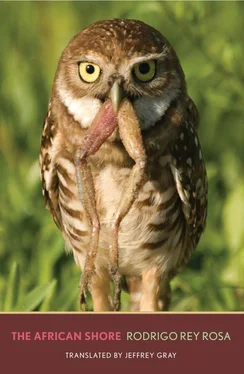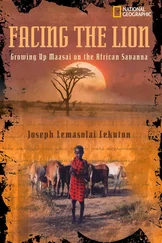The African Shore tells two stories, separate and yet so closely intertwined that one would be unintelligible without the other. (Indeed one was written in order to complement and complete the other.) The first is that of an adolescent Moroccan shepherd, Hamsa, who, having come down with a bad cold, is nursed back to health by his grandparents, who work at the villa of a wealthy Frenchwoman. The other concerns a young Colombian tourist who, having lost his passport during a night of drinking, uses this accident as an excuse not to return to his life in Colombia. While waiting for a new passport, buying kif, and courting a French archaeology student named Julie, he writes to and receives letters from his girlfriend in Cali, and we see him, day by day, letting that other life at “home” slip away.
The title La orilla africana could as easily be translated “the African bank,” or “the African side,” as opposed to the European side of the strait — that is, Gibraltar and Spain — or simply the European side of history. The title is not merely geographical. While a critique of empire is not foregrounded in The African Shore, the novel nonetheless touches on postcolonial themes: border crossing, transculturation, local corruption, illegal activity (smuggling), and the yawning chasm between the colonizer (whether tourist or French archaeologist) and the colonized. We know the time frame because “the fate of Pinochet” is a topic at the dinner table chez Mme. Choiseul, and Augusto Pinochet was detained in London between 1998 and 2000. The two “sides” are represented chiefly, as noted, by two characters: the tribal Hamsa, living in an animistic world he never questions, and the cosmopolitan Colombian tourist, unnamed until almost the novel’s end, ready to sever all ties with his former life. The two worlds are not opposed but separate, their points of contact fleeting and incomplete.
Significantly, the moment that we finally learn the name of the Colombian protagonist is the very moment that he breaks out of the passivity that has enveloped him up to this point, eludes mortal danger, and starts, we imagine, a new life, one we will never know, though we sense that he stands on the first step of a long journey. The story of Hamsa is equally incomplete, though we suspect that the exotic possibilities placed in his mind by his uncle Jalid will remain there, not to be realized materially. Only the story of the owl — through whose eyes and ears we sometimes see and hear the world, both sides of it — offers a kind of closure. Only the owl, coveted by both sides— Christian and Muslim — achieves escape velocity.
From the beginning of his career, Rey Rosa diverged from the realist path taken by his fellow Guatemalan writers. His first books (especially the three that Paul Bowles translated) were written under the sign of Borges — cryptic, perhaps mystical (“Like many young men I was or thought I was a mystic,” he remarks in an interview), economical, if not ascetic, and diaphanous. Of the stories in Dust on Her Tongue, Bowles said, “[They] are as compact and severe as theorems, eschewing symbol and metaphor, making their point in terse, undecorated statements which may bewilder the reader unaccustomed to such bareness of presentation.” When asked how he shifted from this asceticism to the style and concept of his later fictions, Rey Rosa says that “it was a simple matter of writing longer works that made me try a different style. . The very brief stories tend toward prose poems, and in many cases benefited from a certain obscurity or hermeticism. On the other hand, in longer works obscurity becomes a defect. The urge toward clarity becomes an obligation.” By the late 1990s he was moving toward realism, especially the subgenres of noir.
The African Shore seems to lie somewhere between these poles — telegraphic but grounded in material place and time, indeed based on concrete experience, hardly obscure but nevertheless ambiguous. (In common with the stories of Roberto Bolaño, the action in Rey Rosa’s novel seems often to portend something that in fact may not occur.) Rey Rosa has said on this topic that one works to get precision and clarity, whereas complexity and ambiguity are matters more of the personality of the narrator, of the subjectivity. They are spontaneous or inevitable.
During the months prior to Bowles’s death, Rey Rosa stayed in the Hotel Atlas. It was “an art deco building,” he says, “and that’s where I started to write the only one of my novels that takes place in Tangier, La orilla africana. It was winter and the heating in the Atlas never worked properly, so that when I was invited to spend the rest of my stay in a big 19th-century European house with large gardens in Monte Viejo, and with views of the cliffs that span both pillars of Hercules and the city of Tarifa set into the Spanish coast, I counted myself the luckiest Guatemalan in all Africa.” Setting this account beside the novel, one sees immediately how much the latter owes to such lived details, which frame the situation of the Colombian protagonist: the big European house and its garden, Monte Viejo, the Marshan, the European residences on the outskirts, Sidi Mesmudi, even the eucalyptus in the fireplace. La orilla africana is saturated in the atmosphere of Tangier and its environs — not in the layered way of a Graham Greene novel or a Bruce Chatwin travel book, but in Rey Rosa’s signature blend of rigor, ellipsis, and specificity.
Rey Rosa spent his last long residence in Tangier in 1998. “Hassan II had just died,” he writes, “and his son was going to bring many changes, most of them purely cosmetic. But changes in the outside world had also affected Tangier — one saw women police in the streets, shanty towns of Moroccans from the interior had sprung up, along with ghettos of immigrants from other parts of Africa, who made Tangier their last stop before launching their assault on the fortress of Europe. The city had changed so much compared to the Tangier of the 1980s that one might repeat what Bowles wrote comparing the city he’d known in the ’30s with that which came to be in the ’50s: ‘the only thing that remains is the wind.’”
Rey Rosa ends his memoir of Bowles as he began it, with a dream: it is after the American writer’s death, and his books are being burned. Rey Rosa thinks it’s a cremation, but then he and Abdelouahaid, Bowles’s long-time assistant, hear a scream, coming from a metal bust of Bowles. They run into the fire and push some buttons on the neck and back of the bust, which opens up to reveal the old and frail Bowles himself. They carry him through the flames, out through the lobby, “where one can see the Tangerine night full of stars and the ghostly roman cypresses beyond the big gate of the Monte Viejo mansion with its Moorish arch standing wide open.”
In its cadence and mystery, as well as in its final image (with that mixture of “clarity and enigma” that the Catalán writer Pere Gimferrer has noted in La orilla africana ), this record of the end of a dream may remind one of the ending of the novel itself, set as it is on a fault line between cultures and continents: the owl flying through the now open door, seizing the long-awaited chance to circle beyond the African and European sides, and to find its perch in a distant and undetermined place.
ABOUT THE AUTHOR AND THE TRANSLATOR
RODRIGO REY ROSA is perhaps the most prominent writer on the Guatemalan literary scene. Along with the work of writers like Roberto Bolaño, Horacio Castellanos Moya, and Fernando Vallejo, Rey Rosa’s fiction has been widely translated and internationally acclaimed. His books include Dust on Her Tongue, The Beggar’s Knife, and The Pelcari Project, all of which were translated into English by the late Paul Bowles. In addition to his many novels and story collections, Rodrigo Rey Rosa has translated books by Bowles, Norman Lewis, François Augiéras, and Paul Léautaud.
Читать дальше












